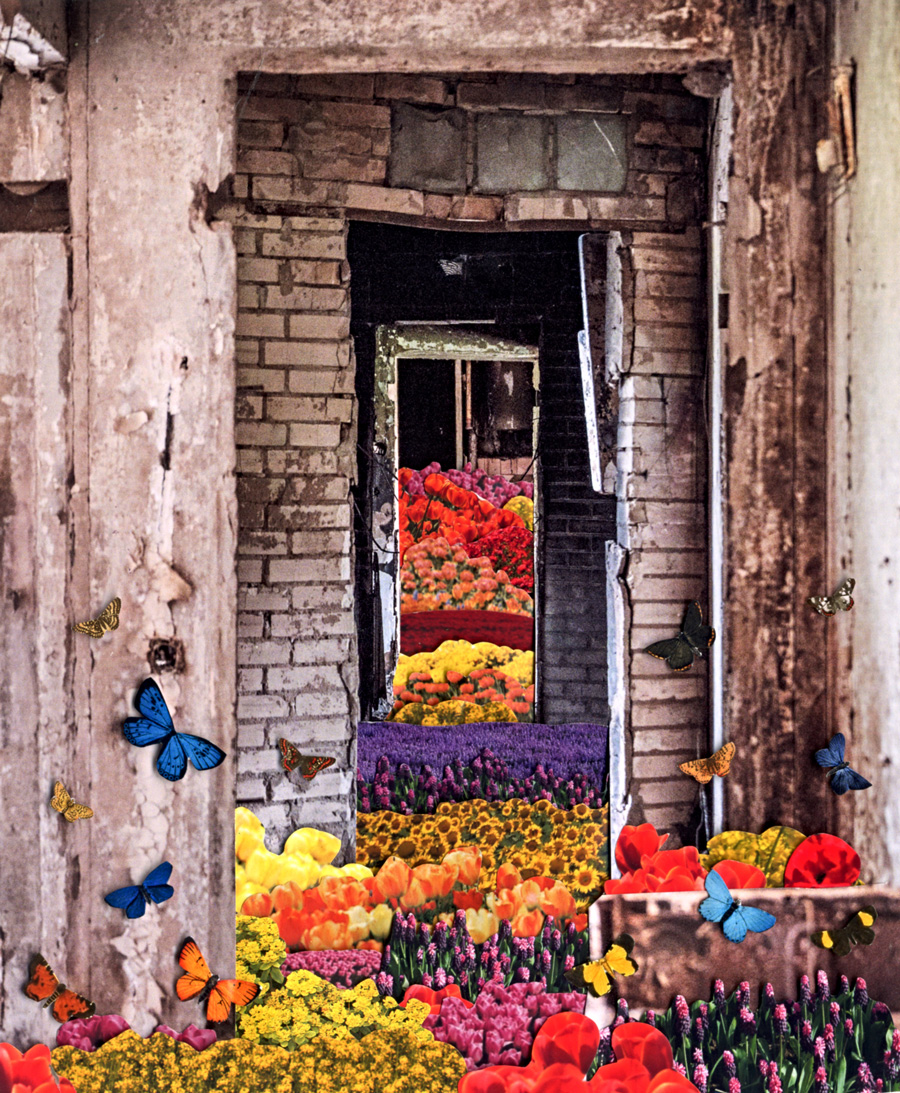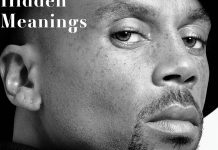
Illustration by Ben Giles
A few days after Russia invaded Ukraine at the end of February, a poem about complacency called “We Lived Happily During the War” went viral. Its opening lines read,
And when they bombed other people’s houses, we
protested
but not enough, we opposed them but not
enough.
It’s the first poem from Deaf Republic, a finalist for the 2019 National Book Award in poetry, which tells the story of people living in an occupied town who begin communicating in sign language to protest the killing of a deaf child. Deaf Republic is the second collection of poetry by Jewish Ukrainian American poet Ilya Kaminsky, who is hard of hearing.
Winner of the Whiting Award and a Guggenheim fellow, Kaminsky was born in the port city of Odesa in 1977, when it was still under the control of the Soviet Union. In 1993, the U.S. granted his family asylum. He has lived in Atlanta since 2018, where he serves as the Bourne Chair in Poetry at Georgia Tech and the director of Poetry@Tech.
I emailed with Kaminsky in late April about his loved ones back home, what it’s like to witness war in his homeland from thousands of miles away, and poetry.
How do you find yourself maintaining ties to Ukraine during this time of war?
My uncle is in Odesa right now. He’s just back from the hospital, recovering from a particularly tough case of Covid. The Russian missiles that exploded in Odesa [on April 23], killing eight people, including an infant, and injuring many others, exploded just one block from his apartment. Meanwhile, my uncle is learning how to walk again and sit down post-Covid. While air-raid sirens go nonstop all day, he is emailing me about his love for fish soup called ukha.
A friend from Kyiv writes about spending whole nights in subway stations—which are being used as bomb shelters—reciting poems to herself and those around her to keep sane. When she grows tired, she starts translating those poems into other languages, just as a way to keep going.
You know how critics in the West often ask whether poetry matters? I now realize that the only valid response to this question is: Do such critics matter?
If a person sheltering deep underground as her city is bombed recites poems as a survival tool—to soothe herself and others—that is all the evidence I need that poetry matters. But we, as human species, always knew that.
Or, here is a story for you: I have been translating a poet who’s lost his home in Bucha, Ukraine. Russian soldiers occupied his house, he tells me; he says the same young soldiers invaded Chernobyl before coming to Bucha, having had no idea of the disaster that unfolded there more than 35 years ago. No one told them what they were heading into, he tells me. Because the young soldiers brought very high levels of radiation with them from Chernobyl into the poet’s Bucha house, it is no longer habitable.
It is too real. In the middle of the ransacked city of Bucha stands a house whose owners cannot return to it because of radiation—an invisible war still lives in those rooms, long after the soldiers are gone.
In March, you helped organize Voices of Ukraine, a transatlantic poetry reading featuring Ukrainian poets and translators. Eight hundred people attended over Zoom. What is it about poetry that brings people together during a crisis?
While we read poems on that day, the 40-mile Russian military convoy was positioning itself north of Kyiv. The West watched as young civilians took up guns, sandbags, Molotov cocktails.
“The West is watching us,” a friend wrote that week. “This is their reality-TV war, they are curious to see whether we will go on living, or die.”
Another friend emailed: “We saw fighter aircraft, helicopters, and Russian paratroopers from our window. But we walked for miles.” He tells me that they’re safe now: His wife is in Poland, and he’s in Ukraine. He sends photos of the city where they lived.
A different day, a friend from Kyiv wrote: “Am in Bukovina, took 2 dogs and 1 cat with me, Sophie’s choice, left 3 cats behind, being cared for by a neighbor.” It’s unbearable, she tells me. She is 12 miles from the Romanian border. Eventually, she crosses with only one dog.
An Odesa friend contacted me to say: “I’ve seen today [a] 10-km queue in Palanca and approx. 500–600 people that were walking by feet. Mamas with kids and it’s snowing and some kids crying, others have serious men’s eyes.”
How can poetry describe something like this? How can any language speak of a country that’s bombarded while the rest of the world looks on?
Here is a poem by Lesyk Panasiuk that I am currently translating:
Letters of the alphabet go to war
clinging to one another, standing up, forming words no one wants to shout,
sentences that are blown by the mines in the avenues, stories
shelled by multiple rocket launches.
A Ukrainian word
is ambushed: Through the broken window of
the letter д other countries watch how the letter і
loses its head, how the roof of the letter м
falls through.
The language in a time of war
can’t be understood. Inside this sentence
is a hole—no one wants to die—no one
speaks. By the hospital bed of letter й
lies a prosthesis it’s too shy to use.
You can see the light through the clumsily sewn-up holes
of the letter ф—the soft sign has its tongue torn out
due to disagreements regarding
the etymology of torture. There is too much alphabet
in the hospital rooms of my country, too much, too
much alphabet, no place to stick an apostrophe; paint falls off
the walls, showering us with words incomprehensible
like men who, in wartime, refuse to speak.
As I am working on this, I can’t help but email him to see if he’s okay. Trying to help in some way, I offer him money, which he refuses. I don’t need your money, he says. Translate my poem, publish it in the world.
To him, as to me, poetry now is as necessary as ever—not because it is pretty or fancy but because it helps us to articulate the most impossible moments: It gives us a gasp, a scrap of air in our lungs. When we have nothing else, we can still hold a handful of words in our memory, a tune, and that might be all we have got now to survive—we don’t know yet. But if we are lucky, it is there, stored in our memories. Keep it safe, this verbal music.
Memorize new lines of poems if you can. You might need them one day, warplanes or not. When facing the blank wall that is crisis, everyone needs a bit of music, a tune, a balm.
You and your wife, the poet Katie Farris, are both waiting. About your wait, you write: “I’m watching friends from Odesa waiting to lose what my family lost in 1993: a city, a language, a home.” Katie is waiting to see if her breast cancer has returned. How does writing help you cope?
Somewhere in his essays, the poet Charles Simic says: “The secret wish of poetry is to stop time.” I agree with this notion.
Of course, what Katie is going through is so different: While I am an observer, someone who has family and friends in the war zone, yes, worried, yes, and yet, at the end of the day, I am here in Atlanta, in safety. Katie’s war zone is her own body. Her bravery and her ability to find music and vivid imagery and stories from the intensity of her waiting is so much more crucial than mine can ever be. I am watching her in awe. She makes art out of terror, daily, and others live by that music. I know I do.
How has the pandemic shifted how you, or how any of us, engage in dissent, particularly when it seems dissent is becoming more dangerous than ever in many parts of the world?
Years before I wrote this book, I was a kid who walked into a college classroom and was introduced to a terrific book, Extraordinary Bodies by Rosemarie Garland Thomson, now a classic in disability studies. At the start of that book, she says a very simple and, yet, for that time, a revolutionary thing: “I want to move disability from the realm of medicine into that of political minorities.” It took decades and a global pandemic for many Americans to realize that, in their country, without health insurance, without sometimes basic human rights, many of us are just that: a political minority. And, our dissent is the only thing we have to speak for us in a country where corporations have more rights than people do.
Deaf Republic touches on this, too.
Deaf Republic is a fairy tale told by a refugee that speaks to different kinds of violence, the violence in East Europe, which you see now on TV, but which has been ongoing for quite some time. And as for the violence in the United States: I lived for over a decade in San Diego, California, only nine miles from the border. The images of the border, the photos of children in cages, is something that you see in newspapers these days. But they have always been there, for decades. Someone who is an immigrant or a refugee is quick to see these similarities, the silences of the street when a kid is shot by a man in uniform in America and everyone is watching and saying nothing. It is as if the silence itself has become a language of crisis. How is that silence different from the West’s silent refusal to close the sky over Ukraine, so Russian missiles are falling on the roofs of civilians’ apartment blocks?
If we don’t dissent, we are faced with silence. It might take many forms, many narratives, this silence. But it is up to us how to articulate, and where to end up with it.
Deaf Republic is also a love story. It is about a pregnant woman and her husband in the middle of occupation. It is about community and what might be possible, despite the odds. In the end, community-building and storytelling are also acts of resistance; changing the language itself, via new stories and poems, is certainly that, too.
The empire is interested in dull language. It is interested in reporting that “collateral damage has occurred” instead of plainly stating that “a helicopter has bombed a wedding with 347 guests, including children.” The empire is interested in normative speech. The poet is interested in exactly the opposite, in the language of the senses. “A poet must be a professor of the five senses,” Lorca tells us. I agree with that notion.
The far right continues to wage wars against certain kinds of information, pedagogy, and curricula. What is it like to be an educator in this increasingly antifact, profascist moment?
Certain conservative “political leaders” in fact paid a visit to my university, not long ago. See, it is a cheap way to raise their standing with their supporters—they make a noise and others clap. It is a sport, and they hope that the noise gets name recognition to the noisemaker, and a higher office.
But as history has shown us: These narratives fall apart, just as Putin’s narratives fall apart. Repression won’t win and tanks run out of oil and Ukrainian farmers, on horses, chuckle and offer to tow those tanks back to Moscow. Just like Putin, in their smaller, sillier ways, these “political leaders” have no ground—except for fear and hate—to stand on.
Why?
Because they don’t understand that education isn’t just about this or that particular narrative. Education is about paying attention. A young mind who pays attention sees the world with vividness and multiplicity of perspective.
Because no matter what: I will teach how to pay attention to the world. The student who is taught to pay attention won’t believe the lies of Fox News or any other such propaganda.
Because anyone who pays attention knows: Our world is various, and, in the end, this is perhaps our final defense.
This interview was edited for length and clarity.
This article appears in our July 2022 issue.














